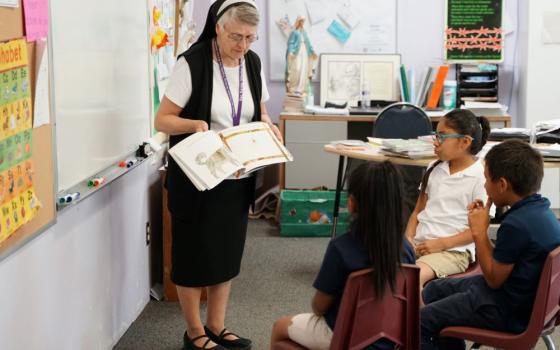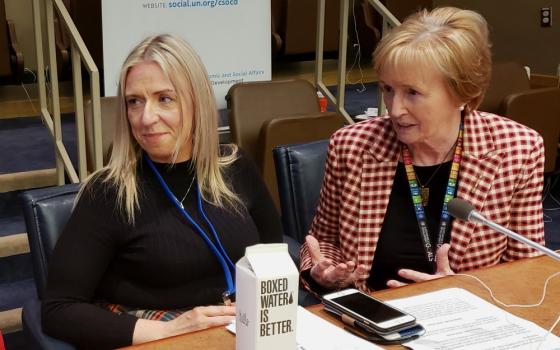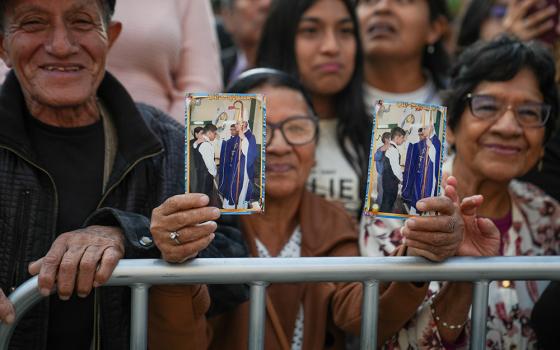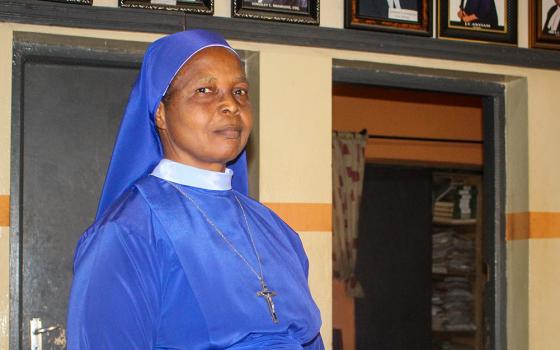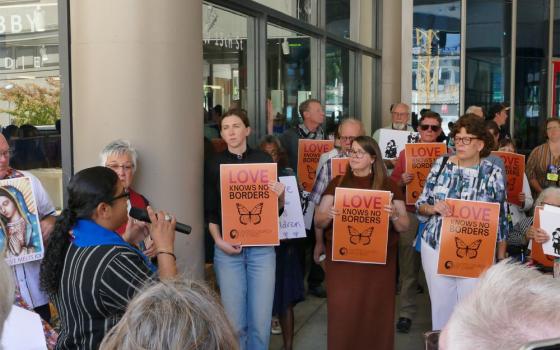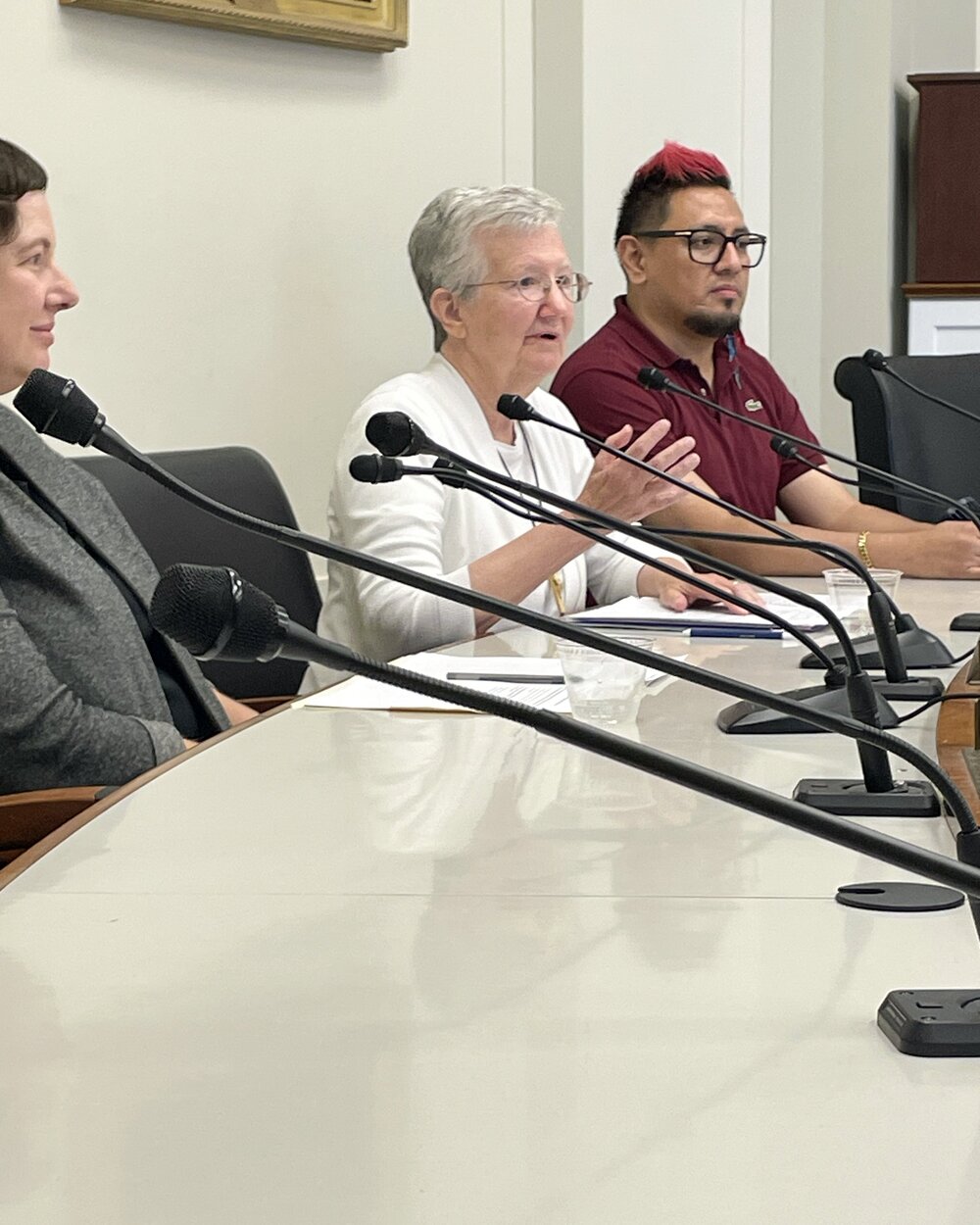
Felician Sr. Maryann Mueller, a founding member of the Alliance to End Human Trafficking, speaks at a July 16, 2025, Capitol Hill press conference about three new pieces of legislation designed to both help victims of human trafficking and enhance safety for children online. (OSV News/Courtesy of the Alliance to End Human Trafficking)
Two Catholic service organizations have joined forces to back three new pieces of legislation designed to both help victims of human trafficking and enhance safety for children online.
Representatives of the Alliance to End Human Trafficking and the National Advocacy Center of the Sisters of the Good Shepherd spoke at a Capitol Hill press conference on July 16.
One bill, the Frederick Douglass Trafficking Victims Prevention and Protection Reauthorization Act (H.R. 2961), is a reauthorization of the Trafficking Victims Protection Act first adopted in 2000. It must be reauthorized every three to five years, but that last occurred in 2018, with funding drawn from various sources since then.
Rep. Chris Smith, R-N.J., a Catholic and co-chair of the House Pro-Life Caucus, introduced the new bill in April and told the event he hoped to get it to a full House vote in September, after which it heads to a Senate vote, if passage is not blocked there.
Felician Sr. Maryann Mueller, a founding member of the Alliance to End Human Trafficking, told OSV News the bill "returns to fundamentals."
The legislation calls for funding to "create a scalable, repeatable program or model, to be publicly available for distribution online, that can be adapted to address the needs of any school to prevent child labor trafficking, child sex trafficking, and child sexual exploitation and abuse including grooming, child sexual abuse materials, and trafficking transmitted through technology," and additional funding to find housing for trafficked men and women.
Smith called it "an initiative to end modern-day slavery."
He would not speak of any challenges that might be involved in getting President Donald Trump's administration to enforce the bill if it receives both House and Senate passage, preferring to reflect on the challenges of previous presidents, going back to George W. Bush.
Smith found himself saying of the bill's elements: "It does not say you 'may' do it, Mr. President. It says you 'shall' do it."
Previous versions of the bill have died in the Senate, and bipartisan consensus has been difficult to find there, Smith said.
Advertisement
The Trafficking Survivors Relief Act (H.R. 1379) would vacate and expunge convictions of trafficked persons who committed nonviolent crimes, such as participating in identity fraud or selling drugs.
Rep. Greg Landsman, D-Ohio, a supporter of the legislation, introduced in February by Rep. Fray Russell, R-S.C., said its purpose is "very, very simple — to clear criminal records for those forced to perform illegal acts while being trafficked."
Criminal records are an obstacle to finding employment outside of low-wage unstable jobs, as well as renting apartments.
Traffickers find their victims by promising a sexual interest or help with family support or employment, said Heather Heiman, a lawyer and project manager in the Maryland Volunteer Lawyers Service.
"Most of the survivors I've talked to said they felt completely trapped," she said, adding that all suffer from "extreme trauma."
The 2024 Global Report on Trafficking in Persons from the United Nations reported that in 2022, the most recent year for which statistics were available, there were 74,785 people "detected" (reported by police as actual cases) as trafficking victims. That represented a 43% increase from 2020 and does not reflect the actual prevalence of the crime.
The Kids Online Safety Act (S.1748), introduced in the Senate by Sen. Marsha Blackburn, R-Tenn., specifies a "duty of care" for online platforms, saying they "shall exercise reasonable care in the creation and implementation of any design feature to prevent and mitigate" harms to minors "where a reasonable and prudent person would agree that such harms were reasonably foreseeable by the covered platform and would agree that the design feature is a contributing factor."
These include eating disorders, depressive and anxiety disorders, online harassment, sexual exploitation and abuse, and distribution and sale of drugs, tobacco and alcohol.
Maryann framed the bill in terms of suicide prevention, citing, as an example, a teen girl she knew who had been coerced into posting for nude photos.
"Every day we delay, our children's lives are at risk," she said. "We know that children are very tech savvy" and many can have, for instance, multiple Instagram accounts — "one for their parents, and one they view with friends."
She said the legislation would "mandate that Congress preserve the sacredness of childhood as a national concern."
